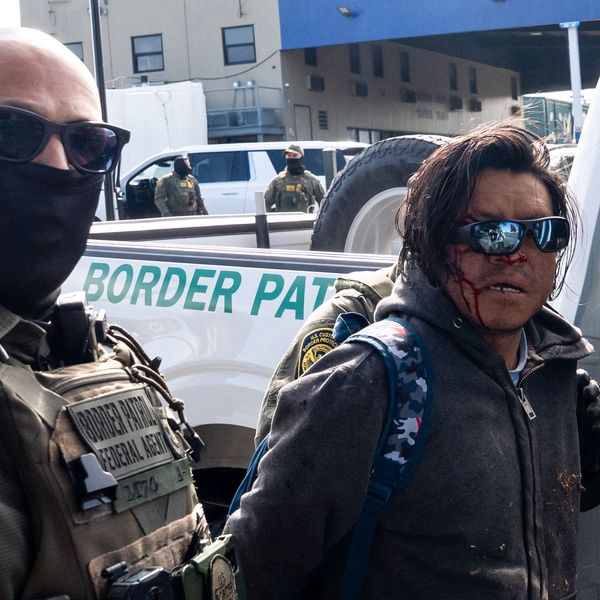A march on Staten Island in New York City is underway on Saturday where community members are voicing outrage over persistent patterns of police violence nationwide while they also commemorate the recent deaths of several black men at the hands of officers accused of using excessive force.
Organized by those mouring the recent killing of Eric Garner, who died after being aggressively tackled and choked by Staten Island police officers last month, the demonstration is also being joined by people from all over the country, including the parents of Michael Brown, the 18-year-old black teenager who was gunned down by a police officer in Ferguson, Missouri on August 9. Brown's death sparked more than two weeks of protests in Ferguson and a national dialogue about race, police accountability, and the increasingly militarized nature of local U.S. law enforcement.
"We hope it will be a success and people will understand why we're doing it," Gwen Carr, the mother of Eric Garner, told the New York Daily News on Friday. "We hope the people who are supposed to hear our outcry respond to it."
The mother of Amadou Diallo, a man killed in a 1999 shooting by four NYPD officers, also spoke Saturday morning ahead of the march and said: "Police cannot judge our sons and execute them for no reason."
Though streets were blocked off for the march and some businesses reportedly decided to close to avoid the expected crowds, the march was billed as peaceful rally. According to the Staten Island Advance news site--which is providing live coverage of the march-- the early police presence attending the rally was "conspicuous but subdued."
A video loop of protesters in Staten Island via Vine:
Led by Rev. Al Sharpton's National Action Network, the NAACP, United Healthcare Workers East (1199 SEIU) and the United Federation of Teachers--the march brings together a wide array of community groups and individuals offering a shared message against police violence and the need to address a woeful pattern of treatment against communities of color, especially young people who face glaringly disproportionate levels of abuse and mistreatment at the hands of officers.
"We aren't saying all police are bad," Sharpton said in a statement. "We aren't marching against the police. We are marching against the chokehold."
Marching under the collective banner of "#WeWillNotGoBack," the hashtag was trending on Twitter as it tracked the day's march:
An editorial in the New York Times on Saturday argued that for the city, the day's demonstration goes deeper than the death of Garner, given the ongoing political dispute that has focused on the way the NYPD polices the city:
The protest planned for Saturday on Staten Island promises to be a galvanizing moment for New Yorkers angered at the death of Eric Garner, the 43-year-old African-American who was unarmed when he was fatally assaulted in July by the police. Marchers, led by the Rev. Al Sharpton, will demand justice for Mr. Garner and his family, and will denounce police brutality.
In one sense, the protesters have already won. The Garner case is not being brushed aside; the Staten Island district attorney has said he will present it to a grand jury, and the involvement of several other oversight bodies seems to assure a thorough investigation. What is less certain -- and this is the larger point of the protest -- is whether aggrieved residents will achieve some level of faith in the future of policing in Mayor Bill de Blasio's New York.
The question cuts several ways. The city today feels like one of those shimmering portraits that change depending on the direction of your gaze. Stand here and it looks like the 1990s again: There is Mr. Sharpton, leading mass marches in minority communities and vexing the establishment. Here are the stirrings of white anxiety, stoked by the tabloid press and cynics like former Mayor Rudolph Giuliani, who point to an uptick in shootings and stray squeegee men and say Mr. de Blasio has brought us to the eve of destruction. Here is the city seemingly split into opposing camps over "broken windows" policing, the philosophy of cracking down aggressively on petty offenses like the one Mr. Garner was accused of, selling loose cigarettes, to deter more serious crimes.


